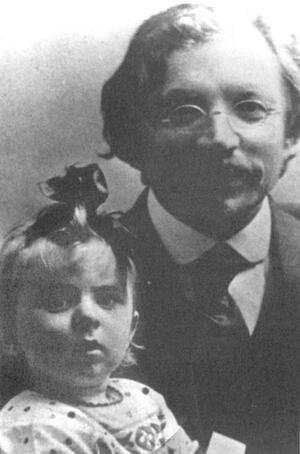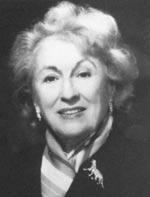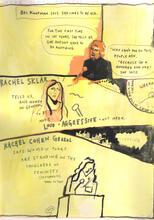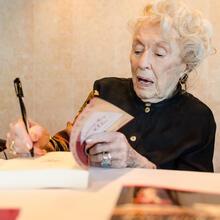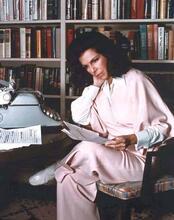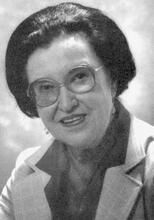Bel Kaufman
Bel Kaufman was a writer best known for her novel, Up the Down Staircase, which explored the absurdity of New York City’s public school bureaucracy. The book and its subsequent film were a cultural phenomenon when released in the 1960s and were hailed by the New York Times as “a stunningly accurate portrait of life in an urban school.” Kaufman was also the granddaughter of Yiddish writer Sholem Aleichem, whose writing formed the basis for the musical Fiddler on the Roof. When Kaufman passed away at 103 at her home in Manhattan, both legacies had shaped her life and work as a writer and public speaker.
Bel Kaufman was a writer best known for her novel, Up the Down Staircase, which explored New York City’s public school bureaucracy, parodying the absurdity encountered by an idealistic young teacher navigating a system offering directives that seemed to be against all common sense. The book and its subsequent film were a cultural phenomenon when released in the 1960s and were hailed by the New York Times as “a stunningly accurate portrait of life in an urban school.” Kaufman was also the granddaughter of Yiddish writer Sholem Aleichem, whose books formed the basis for the musical Fiddler on the Roof. When she passed away at 103 at her home in Manhattan, both legacies had shaped Kaufman’s life and work as a writer and public speaker.
Early Life & Education
Belle Kaufman (she would later shorten it to Bel) was born in Berlin, Germany, on May 10, 1911, but spent her early childhood in Odessa and Moscow with her Russian parents, Michael J. Kaufman, a physician, and Lala Rabinowitz Kaufman, also a writer and Sholem Aleichem’s daughter. In December 1923, the family immigrated to the United States with twelve-year-old Belle to escape the dangers of post-revolutionary Russia.
When the family arrived in New York City, Kaufman did not speak English. She was taken to the local public school by her mother, who knew no more English than she did. Kaufman was enrolled in a first-grade class with children half her age and felt immensely awkward. She recalled that her uneasiness was appeased by the kindness of her teacher, which had a profound effect and inspired her to one day become a teacher too.
Marriage & Teaching
Kaufman graduated magna cum laude from Hunter College in January 1934. In 1936 she married Sydney Goldstine; the couple had two children, Jonathan and Thea. As a young wife, she completed her master’s degree in literature at Columbia University in 1936. While at Columbia, Kaufman was offered a doctoral fellowship, but she had to decline to support her husband in medical school. Kaufman then began a teaching career in New York City public schools, which spanned three decades and inspired her famous book.
Kaufman’s daughter, Thea Goldstine, recalled that mother’s keen eye was evident in her personal style: “She paid attention to the details.” She exuded a warm glamour, her daughter said, especially in the grittiness of New York City’s public schools, and always wore fashionable outfits with perfectly done hair and makeup.
Writing
While teaching, Kaufman began writing and publishing her short stories in the late 1930s and early 1940s. At the time, Esquire was considered a gentlemen’s magazine exclusively; it did not publish writing by women. When Kaufman wrote a short story in the early 1940s entitled “La Tigresse” about a femme fatale, her agent suggested that it would be perfect for Esquire, if not for the fact that she was a female writer. They decided to submit the story anyway but shortened her real first name, Belle, to the more androgynous Bel. The story was published in Esquire, and the author adopted her nom de plume.
Up the Down Staircase was originally a short story—only three and a half pages long—published in The Saturday Review on November 17, 1962, under the title “From a Teacher’s Wastebasket.” Gladys Justin Carr, then an editor at Prentice-Hall, contacted Kaufman after reading it and encouraged her to extend her fledgling story into a full-length novel.
Offering a portrait of a young teacher who shared much of Kaufman’s story, the book chronicles the career of Sylvia Barrett, a new teacher in the public school system, and offers a satirical look at the administrative bureaucracy teachers must overcome in order to perform their jobs. The novel was released in 1964 and spent 64 weeks as a bestseller, five months of which were spent in the number-one position. Up the Down Staircase was translated into sixteen languages and has sold over six million copies. Time magazine would call it “easily the most popular novel about U.S. public schools in history.”
In 1967, a film was made based on the novel, starring Sandy Dennis and directed by Robert Mulligan. Kaufman served as a consultant on the film and was given a brief cameo as one of the teachers punching in with Ms. Barrett. The film opened at Radio City Music Hall in New York City and was chosen to represent the United States at the Moscow Film Festival (where its title was translated Up the Staircase Leading Down). In June 1977, Up the Down Staircase became a play and a popular choice for many public school drama productions. While the book was by far her most popular publication, Kaufman’s favorite work was Love etc. a novel written about a woman facing divorce and reinventing herself in the 1970s.
Honors & Legacy
Kaufman’s contributions to social awareness continued well beyond the reach of her famous book. On December 7, 1987, she accepted an invitation from the Soviet embassy to join Russian leader Mikhail Gorbachev as his guest at a reception held for prominent Americans. During this same year, she participated in the Moscow International Forum for a Nuclear-Free World at the invitation of the Soviet Union. There she delivered a speech on “The Role of Culture in Protecting Civilization and Universal Human Values.”
In her later career, Kaufman became involved in theatrical writing and lecturing and was a popular public speaker. After her first marriage ended in divorce in 1962, she partnered with Sidney Gluck in the 1970s. Gluck headed the Sholem Aleichem Memorial Foundation, where Kaufman was the honorary chair. The foundation was created to commemorate her maternal grandfather. Aleichem’s literary legacy was a source of pride and the topic of many of Kaufman’s later lectures.
Bel Kaufman was the recipient of many awards, including UJA, ADL, and Bonds for Israel plaques, the Paperback of the Year Award, and the National School Bell Award. Her great legacy lies in the literature about education in America and in the propagation of Jewish culture.
Bel Kaufman passed away on July 25, 2014. “She was not a religious or particularly spiritual person, but she was very proud to be Sholem Aleichem’s granddaughter,” her daughter Thea, a therapist and painter, shared with the Jewish Women’s Archive. “When she spoke she had audiences in the palm of her hand. A lot of people adored her and she had very connected fans. It meant a lot to her that people responded deeply. She possessed a strong sense of her own uniqueness.”
Selected Works
Up the Down Staircase. New York: Prentice-Hall, 1964.
Love, Etc. New York: Prentice-Hall, 1979.
La Tigresse: And Other Short Stories. New York: Open Road Media, 2012.
This and That: Random Thoughts and Recollections. New York: Open Road Media, 2012.
Berger, Joseph. "At 100, Still a Teacher, and Quite a Character." New York Times, May 11, 2011, https://www.nytimes.com/2011/05/12/nyregion/bel-kaufman-at-100-still-a-teacher-and-a-jokester.html
Ellenson, Ruth Andrew. "Bel Kaufman." Jewish Women: A Comprehensive Historical Encyclopedia. 27 February 2009. Jewish Women's Archive.
Fox, Margalit. "Bel Kaufman, Who Told What School Was Really Like, Dies at 103." New York Times, July 25, 2014, https://www.nytimes.com/2014/07/26/arts/bel-kaufman-up-the-down-staircase-writer-dies-at-103.html
Haberman, Clyde. "A Reading to Recall the Father of Tevye." New York Times, May 17, 2010, https://www.nytimes.com/2010/05/18/nyregion/18nyc.html

